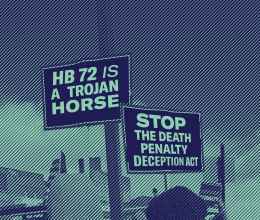In anticipation of the ACLU of Ohio’s spring event series, I sat down with authors D. A. Dirks and Patricia A. Relf to discuss their latest work, To Offer Compassion: A History of the Clergy Consultation Service on Abortion. The authors deconstruct one of the deepest misunderstandings within the pro-life versus pro-choice debate—that it is synonymous with religious belief versus secular humanism. Despite clergy’s role in creating a network dedicated to referring counselees to abortion providers, this aspect of abortion and reproductive history remains largely unexamined.
In the late 1960s, a group of ministers and rabbis in New York City convened for weekly conversations. Driven by two failed attempts at reforming abortion law in 1967, the Thalidomide Scandal of 1962, and and Rubella Outbreak of 1965—which prompted debate about whether abortions should be allowed if the fetus would be born with birth defects—their discussion shifted to advocacy. Leading figures in reproductive rights, including Lawrence Lader of NARAL and lawyers from the New York Civil Liberties Union, spoke regularly with their group, which became known as the Clergy Consultation Service, or CCS.
Motivated by justice and guided by compassion, the CCS brought the “confidentiality of the confessional” status and the respectability of their positions those in need. Dirks and Relf said, “Their main role was to listen. They listened to clients seeking abortion services, and referred them to licensed, trusted physicians out of state. If any physician overcharged or treated their counselees poorly, CCS would negotiate or cut ties. Their role became somewhat akin to a consumer advocate, as they realized their power.” The CCS viewed their participation as an extension of their previous civil rights, anti-poverty, and anti-war work. As Dirks and Relf summarize, “It was part of the whole.” Their previous connections from civil rights work built the network that allowed them to expand out of New York City to cities and campuses nationwide.
Here in Cleveland, the CCS worked with Planned Parenthood, the Free Clinic, and Education for Freedom of Choice in Ohio (EFCO), among others. As a member of EFCO, ACLU of Ohio Executive Director Christine Link was present at these initial meetings in 1972, laying the foundation for Preterm.
In 1970, New York legalized abortion, and the CCS opened a clinic that day. Referred to as Women’s Services, the clinic became a national model and representatives came from across the country to observe their practices. They pioneered outpatient care, demonstrating in a 1972 New England Review of Medicine article that outpatient abortion was as safe as an inpatient hospital procedure. They hired women as counselors and “most importantly,” Dirks and Relf add, “treated every patient humanely.” After Roe v. Wade in 1973, though clergy no longer needed to provide the counseling service, they didn’t abandon the cause. They monitored public hospitals’ abortion care, prevented the proliferation of for-profit abortion referral services, and joined the Clergy Advocacy Board of Planned Parenthood.
To Offer Compassion provides critical historical evidence and lessons for the reproductive justice movement of today. Relying on oral testimonies from aging clergy involved with CCS and limited archival sources (given the clandestine nature of the work), Dirks and Relf record stories almost lost to history. The willingness of the CCS to take risks, listen, and work across social justice movements was, and still is, necessary and difficult. As one of my favorite thinkers, Robin D. G. Kelley, writes, “We need solidarity more than ever, recognizing that all solidarities are imperfect, often fragile, temporary, and always forged in struggle and sustained through hard work.”
Join the ACLU of Ohio on July 6 to hear more from these incredible authors, and order a copy of To Offer Compassion.




